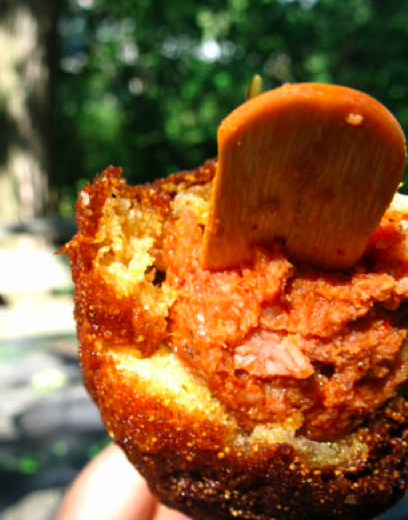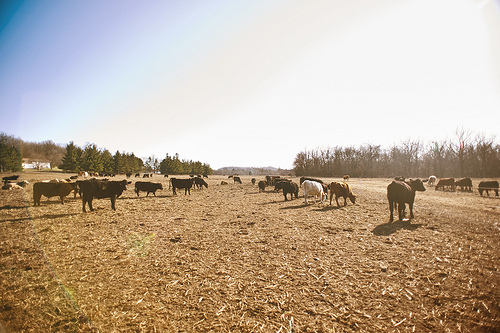A few alarming statistics:
- If current trends continue, 1 out of 3 Americans will get type 2 diabetes in their lifetime. This includes 1 out of 2 African Americans and Latinos.
- 32% of African American adults in Boston are obese, compared with 16% of white adults.
- From The Yorkshire Post: Experts said obesity rates will be 35 per cent to 50 per cent higher among boys from lower socio-economic backgrounds aged two to 10 than among those who are more affluent. Meanwhile, the rate will be 25 per cent to 35 per cent higher among girls.
Obesity as a racist, classist issue was a clear and compelling theme at this year's Kellogg Foundation Food and Society Networking meeting, held from April 27 - 29 in Chandler, AZ. In one moving presentation, Cecil D. Corbin-Mark, Deputy Director/Director of Policy Initiatives at We Act for Environmental Justice, based in Harlem, New York, put it this way:
"We used Josalito - a boy who was very overweight - as an example of the problems we face. Walking down 125th Street in Harlem on his way to our office, Josalito passed a McDonald's, a Burger King, a Popeye's Chicken, and a KFC. KFC had a walk-up window right on the sidewalk, so Josalito didn't even have to go into the store to get his fill of fat and salt. Notice that there was no grocery store on 125th Street."
The facts are compelling and clear:
- People in poor areas often do not have access to fresh food.
- Good food often costs more money.
- Fast food restaurants target minority groups with their advertising dollars.
 Photo credit: Kris HaseBut what about the rest of us? What about those who can afford good food but choose not to buy it? Why do we overwhelmingly, consistently make poor food choices for ourselves and our kids, even when we know better? Here are a few ideas:
Photo credit: Kris HaseBut what about the rest of us? What about those who can afford good food but choose not to buy it? Why do we overwhelmingly, consistently make poor food choices for ourselves and our kids, even when we know better? Here are a few ideas:
Good food costs more.
On the surface, we tend to accept this as a truism, a simple fact: local and organic food costs more than industrial food. Want evidence? There's loads:
- Grass fed beef costs $1 - $5 more than industrially raised beef per pound.
- Organic apples cost between $0.50 and $1.50 more than industrially grown apples per pound.
- Organic, fair-trade bananas often cost double what industrially grown bananas cost.
Watching the family in Food Inc. struggle with the decision of whether to buy fresh fruit or fast food for their family (even though the dad had diabetes!) really helped drive this point home for me. Nevermind the reasons - in the short term, bad food tends to be easy on the wallet.
But why do families who can afford good food choose note to buy it? During his presentation last week in Minneapolis, Joel Salatin said this:
"When it comes to most things, we believe we get what we pay for. Shoes, clothes, cars ... but when it comes to food, we don't believe that. Most of us have a more intimate relationship with our hair cutter than we do with our farmer."
We've come to think of cheap food as our right, and the idea of paying more when we could pay less seems silly, almost un-American. We're saving our money for the things we think are really important, like cable TV and betting on football games.
But cheap food is a fallacy: it simply does not exist. When we choose to purchase industrially grown vegetables laden with pesticides, corn fed beef devoid of its nutritional value, and pork raised near manure lagoons, we pay the price. Healthcare costs skyrocket (the system is overwhelmed with type-2 diabetics and other obesity-related patients) as does the cost of cleaning up the environmental messes we make.
Simply put: we can pay a fair price for our food now, or we can pay a lot more for our health and environmental safety later.
Bad food tastes great.
Try one of these experiments:
- Pour two glasses of milk for your kids: one with chocolate, one without. Ask your kids which one they like more.
- Next time the fellas come over, put out a bowl of french fries next to a bowl of baked sweet potatoes. See which one is eaten first.
Most Americans think a Big Mac tastes better than a turkey sandwich, and the fat, sugar, salt, and infused flavors in that Big Mac are meant to keep it that way.
Why do we feed our kids soda with their lunch? Why do we choose a Whopper instead of a salad? Why do we knowingly feed ourselves and our families food that is not good for us? Why do we cling to the bold health claims on the sides of cereal boxes that we know to be untrue? Because it tastes good! And also because...
Good food takes time.
This is true on multiple levels. Good food - pasture-raised, pesticide-free, grass-fed food - often grows more slowly than industrially raised food. Grass fed cattle need extra months to put on weight, for example.
Good food also takes time to prepare. When I told a friend recently that I simply rejected the idea of "the emergency cheeseburger," she laughed. "You can reject it if you want," she told me, "but lots of us need them."
Does it take more time to buy a drive-through cheeseburger than to buy a drive-through salad? No, it doesn't.
Yes, it takes time to wash and cut carrots. It takes time to season and grill fish. It takes time to find a recipe, buy ingredients, and cook a good meal. It takes time to eat with a knife and fork.
Many of us have decided that this is time we don't have. We've prioritized our life activities, and food didn't made the cut. We've decided that food is what we eat in the car between work and soccer practice, rather than something for which we make time.

We hate to deprive ourselves.
We work hard, and we deserve a treat. Many of us have been told what to do all day at work. We've been deprived of sunlight, of a flexible schedule, of meaningful work, of exercise, of all sorts of things that make us feel good and human.
Bad food gives us the illusion of control, and it makes us feel good right away. Guilt and health concerns may come later, but right now we need a treat.
We hate to deprive our kids.
When the marketing teams hit their mark, our kids want sugar cereal, chocolate milk, ice cream, hot dogs, chicken nuggets, and root beer. But why do we give it to them when we can afford better food choices?
Time-pressed, stressed-out parents know the answer: it's hard to say no to our kids. There are all sorts of reasons for this, including:
- We don't like to fight
- We don't want to disappoint our kids
- Negotiating with kids is irritating and time-consuming
- We don't want to hear our kids whine
- "Yes" is a much nicer word than "no."
So, despite the fact that we know the food lacks nutrients - and that we can afford much, much better - we continue to feed our kids the junk they demand.
This doesn't make us bad parents, does it? It's not like our kids are asking for cigarettes or coffee, right? We'd definitely draw the line there. We're not feeding them things that are unsafe, are we?
Bad food is just as safe as good food.
Okay, I'll admit it: I don't believe this at all. When we consume animals raised in feedlots, we consume the antibiotics that they consumed, increasing our own resistance to antibiotics. When we eat apples grown with pesticides, we consume the pesticides they are covered in. When we eat beef that has been contaminated with feces, we consume feces.
Although conclusive results are hard to come by, several studies have shown that organic food grown in rich soil contains more nutrients than food raised on industrial farms. This makes intuitive sense: good soil begets good food. And eating organic produce means we can eat the peel without ingesting bonus pesticides.
In this context, we must also consider the health and safety of our communities and our environment. Good food is produced for a fair price, and does not take more from the earth than it gives back. Good food nourishes our bodies, our minds, our communities, and our planet. Good food doesn't pretend to cost less in the short-term, and then extract its toll on our health and our land over time. Isn't it worth a couple of extra bucks?
Summing Things Up
The issues of racism and classism in our food system are compelling and infuriating. These issues need to be addressed on a daily basis by our communities and our government. But there are many other issues affecting our country's ability to promote the health of our bodies and our planet as well. Understanding why those of us who can afford good food choose not to buy and prepare it can help us understand the cultural and social roots of the problem. And then maybe, just maybe, we can start to fix it.
 Lee Zukor is the founder of Simple, Good, and Tasty. Email him at lee@simplegoodandtasty.com or follow him on Twitter.
Lee Zukor is the founder of Simple, Good, and Tasty. Email him at lee@simplegoodandtasty.com or follow him on Twitter.




